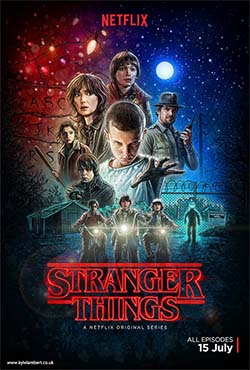
After P.T. took the PlayStation Network by storm two years ago (geez, has it already been that long?), I set up my Google news feed with a subcategory specifically for Silent Hill news. I wanted to keep up with the progress of the game, since it looked like the most promising project the series had seen in a decade. After the traumatic cancellation of Silent Hills, that news feed has been mostly populated with articles mourning the loss, or with conspiracy theories about the game's return. Lately, however, a new story has been repeatedly populating that news feed: reviews and interpretations of the Netflix original series "Stranger Things".
With the internet's insistence that Stranger Things is "the show that Silent Hill fans have been waiting for", and some recommendations from co-workers and friends, I decided to give Netflix's new horror thriller a chance. So while House of Cards and Daredevil still sit unwatched in my Netflix queue, my girlfriend and I powered through all eight episodes of Stranger Things within a week.
Stranger Things reminded me a lot less of Silent Hill, and a lot more of Twin Peaks and E.T., but I loved the series nonetheless. I found myself amazed by just how much the show looks and feels like something from the late eighties or early nineties, and by how well it manages to capture a sense of nostalgia for its sources of inspiration without having to license them outright. Hollywood could learn a thing or two from this show. The insistence on reviving franchises like Star Trek, Star Wars, Ghostbusters, Transformers, Ninja Turtles, Power Rangers, The X-Files, etc., is starting to wear very thin. At best, these films feel like high-budget fan fiction. At worst, they feel like cynical attempts to play off of nostalgia for a quick cash-grab. Very rarely do they feel like genuinely inspired works of creative art. This reliance on adaptation instead of inspiration has created a dearth of creativity that in many cases has tarnished once-venerable intellectual properties.
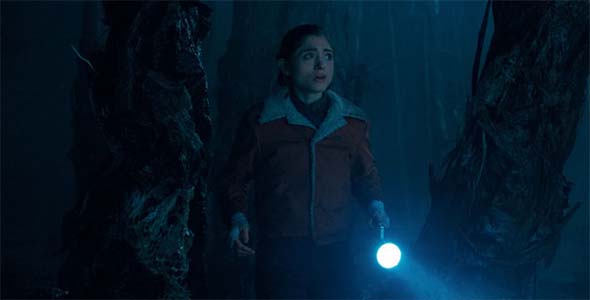
The internet claims that Stranger Things is "the Silent Hill show that fans have been waiting for".
Stranger Things doesn't stoop so low. It wears its influences proudly on its sleeves, but it also remains, thankfully, it's own entity. It never feels derivative; it never feels stale; and it never feels creatively bankrupt. It's not exactly original (as it blatantly incorporates elements of its inspirations into its plots and characters), but it also manages to occasionally surprise with its clever subversions of genre tropes. It never feels like the shallow fan service that I've gotten so used to seeing from Hollywood blockbusters, and (most importantly) I could enjoy it without the baggage of expectations from a recognized namesake.
Much of this is due to the characters and performances, all of which are great... [More]
29ff0687-543f-4935-8af9-e9510696220b|1|5.0
Tags:Stranger Things, Netflix, horror, thriller, science fiction, monster, parallel dimension, upside down, Twin Peaks, Stephen King, Silent Hill, Otherworld, E.T., Stephen Spielberg, the X-Files, Dungeons & Dragons, 1980s, 1990s, nostalgia
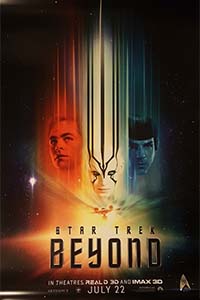
Star Trek: Beyond
I didn't really know what to expect from this movie. I was pleased that Abrams wasn't directing anymore, and that Roberto Orci and Alex Kurtzman weren't writing it. Simon Pegg writing seemed like good news. Justin Lin of Fast and Furious fame directing seemed questionable. The casting of a villain was also disappointing, as it seemed to set the stage for yet another dumb action movie. I watched the trailers, but I tried to avoid larger spoilers and speculation. I didn't want to go into the movie with a bias the way I did with Into Darknes because of all the speculation about Benedict Cumberbatch's character (would he be Khan? Would he not be Khan?).
I was really hoping for Simon Pegg to write a more pure science fiction story instead of a schlocky action movie, especially after the success and hype surrounding The Martian. "Beyond" sounds like a good title for a Star Trek movie. Maybe it would feature the crew of the Enterprise dealing with some kind of environmental challenge out in the unexplored frontiers of space? Maybe it would actually be about exploration and discovery? Maybe it would tell some timeless allegory for the human condition? I could only hope. The announcement of a villain sort of shattered that hope.
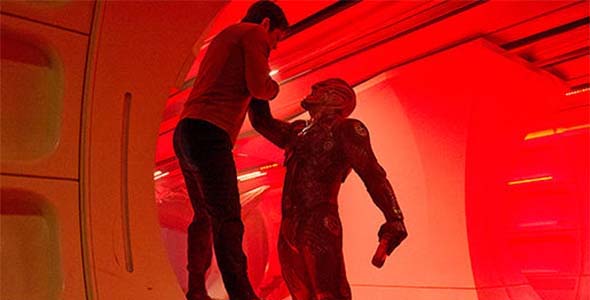
Yet another vengeful supervillain looking for a McGuffin doomsday weapon.
It doesn't help that the villain is really under-written, and that the plot revolves around the bad guy trying to get a McGuffin in order to activate a doomsday weapon. We've only sat through this plot a hundred times in sci-fi and comic book movies over the past decade. If his plan was to attack the space station anyway, then I don't know why he didn't just do it right from the start, while the Enterprise (and the McGuffin) were docked. Come to think of it, why is the Federation building massive, civilian space stations within eyesight of an ominous, unexplored nebula? Meh, I guess that's better than needing the Enterprise to warp back and forth between Earth and the Klingon homeworld in the span of a couple hours... [More]
80e21af4-18df-4984-a5d5-91fbbe299730|1|4.0
Tags:Star Trek, Star Trek: Beyond, Star Trek XIII, Justin Lin, Chris Pine, James Kirk, Karl Urban, Leonard "Bones" McCoy, Zachary Quinto, Spock, Leonard Nimoy, Idris Elba, Krall, Simon Pegg, Montgomery Scott, Enterprise, Yorktown, Franklin, starbase, McGuffin, J.J. Abrams, Alex Kurtzman, Roberto Orci, Star Trek II: the Wrath of Khan, Star Trek III: the Search for Spock, science fiction
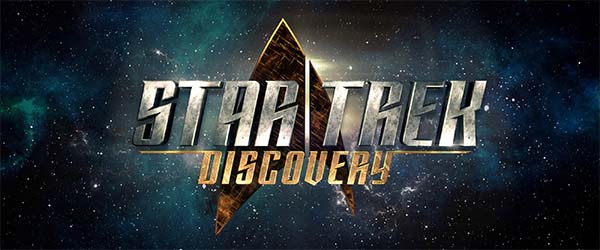
There's still a lot that we don't know about CBS's upcoming Star Trek series for its All Access streaming service. Early information and rumor was that the show would be run by Bryan Fuller (who formerly worked on the Deep Space Nine writing staff), that he had hired Nicholas Meyer (former director of The Wrath of Khan and The Undiscovered Country) to be the show's principle writer, and that the show might be a seasonal anthology series that would take place between the events of The Undiscovered Country and The Next Generation At least some of this information may be incorrect.
Earlier this year, the first teaser trailer was released. It also was not very forthcoming with specific information, but there were a few details that could be inferred.
The first teaser showed little detail, but seemed to imply a confirmation of a seasonal anthology.
The trailer begins in space over earth, but then warps away to exotic locations across space before revealing the show's logo and the tagline "New crews. New villains. New heroes. New worlds.". My interpretation of this teaser (assuming that there's an interpretation to be had) is that it is intended to show us that this new series will be shifting its attention away from Earth and out into deep space. That is promising.
The tagline definitely seems to support the idea of a seasonal anthology, since everything is plural. Granted, it could be a single storyline that just focuses on multiple ships' crews in parallel, but I hope that this is intended to verify that the show is a seasonal anthology in which each new season will be a completely independent, self-contained storyline separate from the previous season(s). However, Bryan Fuller himself has gone on the record as saying that the show is not an anthology series. Instead, he says that the show will "tell a Star Trek story in a modern way". By this, he means that each episode in a season will be a chapter of a larger story. This isn't entirely new to Star Trek, since both Deep Space Nine and Enterprise already had season-long arcs. But even then, those shows were still heavily episodic, with most episodes telling self-contained stories that can be enjoyed on their own without relying on having seen the previous episodes. Not so in this new series. Much like Game of Thrones, Walking Dead, Battlestar Galactica, and so forth, this new Star Trek series will likely require that its audience see every episode, in proper order, to be able to understand what's happening.
A few weeks ago, at Comic Con, we got something a little more concrete... [More]
974cbef6-843a-4ed8-87cb-1916bef03c83|0|.0
Tags:Star Trek, Star Trek: Discovery, CBS, all access, Bryan Fuller, Nicholas Meyer, anthology, seasonal anthology, science fiction, U.S.S. Discovery, Ralph McQuarrie, Star Trek: the Motion Picture, prequel, Star Trek: Phase II

I started writing this post months ago (back in 2015, I think) - long before I had any inkling of the impending release of Civilization VI. This post may be entirely moot now that Civ VI has been announced, and it seems unlikely to me that Beyond Earth will see further expansions. However, I still want to present these ideas, so I've re-written this post to be less speculative and more retrospective. Even if these ideas aren't fated to be implemented for Beyond Earth, it's still an opportunity to look at a way in which the game could have differentiated itself from Civ V, and they could serve as a template for future Civ titles (maybe even Beyond Earth 2) or for modders. Maybe I'll even mod it in myself if I get time and motivation.
Civilization: Beyond Earth really struggled to separate itself from Civ V. The expansion, Rising Tide takes steps to address this with some of its new gameplay mechanics and revised diplomatic engine. Sadly, these efforts don't really address one of the underlying, fundamental, disconnects that the game has with me:
"One of the things that bothered me about Beyond Earth was the way that the victory conditions create an unnecessary competition between the different civs. Aren't we all just colonists from the same earth who are supposed to be trying not to repeat the mistakes of the past? Aren't we trying to preserve the human race? Without the various civs starting the game with any sort of pre-established ideology or agendas, there's no reason for them to be competing with one another. Without a genuine shared victory, there's also no systems in place to share your colonial success with your fellow colonies. The net effect is that once you've defeated the challenge of taming the planet and [one way or another] eliminating the aliens as a threat to your expansion, then the rest of the game is a competition between civs to be the first to reach any of the [mechanically satisfying and varied, yet intellectually vapid] victory conditions."
- from my Rising Tide review

Heck, why are we competing to begin with?
Despite being mechanically different from Civ V's victory conditions, Beyond Earth still fell into the trap of being fundamentally, unnecessarily tribalistic and competitive. I don't know if this is supposed to be some kind of sad, fatalist message that Firaxis is writing into Beyond Earth: that we are doomed to repeat the mistakes of the past. This isn't Fallout. I hope that Firaxis' designers aren't that cynical, and that it was an unintentional emergent consequence of design.
This may seem like a small, trivial, superficial issue, but it's not. Regular Civilization is easy to buy into because it's based [loosely] on established history and uses real-world characters and states that most people are already familiar with. Buying into the theme of Beyond Earth is just so much harder because there's so much of the game that just doesn't make sense, or which doesn't really follow from the opening cinematic or the game's flavor text. This is why Alpha Centauri went to such great pains to personlize the leaders, and to turn them into charicatures of established real-world ideologies and standard sci-fi tropes. These are factions with established goals and agendas that we can understand, and we can buy into their conflicts. Beyond Earth doesn't have that, and so not only do its leaders fall flat as characters unto their own, but the entire basis upon which the game's core conflicts and victory conditions are based start to fall apart as well.
In any case, I think that one of the best ways that Beyond Earth could have truly separated itself from Civ V (mechanically and thematically) would have been to change the competitive nature of the victories and introduce truly cooperative victories, or maybe even a "players versus map" victory type. And I want to emphasize from the start that I haven't put nearly as much time into Beyond Earth as I have into Civ V. I'm by no means an "expert" in the game. So feel free to take the following suggestions with a grain of salt. I admit that these ideas simply might not work, but I still think that it's worthwhile to explore the possibility space that this game could have offered... [More]
41c56220-e572-46c7-b911-40df5b0b6ab2|1|5.0
Tags:Sid Meier's Civilization, Civilization: Beyond Earth, Civilization: Beyond Earth: Rising Tide, Firaxis, 2K Games, PC, Steam, strategy, grand strategy, turn-based strategy, science fiction, space, victory, cooperation, alliance, harmony, purity, supremacy, contact, first contact, domination, board game, Battlestar Galactica, Pandemic, Arkham Horror, Mansions of Madness, Descent: Journeys in the Dark
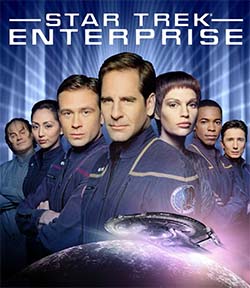
Star Trek: Enterprise is a very divisive topic among Trekkers / Trekkies. Personally, I'm not a big fan. It was a perfectly adequate space adventure TV show, but just never quite worked as hard science fiction for me, let alone as "Star Trek". There were certainly some stand-out good episodes. The haunted space station of "Dead Stop" and the mirror universe antics of "In a Mirror, Darkly" being among my favorites. The annoying thing is that the show made several mistakes at very fundamental levels before it even got off the ground. I could have lived with the show being a prequel, but the efforts to make the show seem both futuristic to the viewing audience, but also less advanced than the (then 40-year-old) original series put the show in an awkward juxtaposition with established series continuity. The hackneyed time travel meta-plot certainly didn't help.
"Juxtaposed" is an excellent way of describing Enterprise as a whole. It's a show that simultaneously seemed ashamed of its "Star Trek" name (remember, it premiered with the title "Enterprise", and "Star Trek" was only stapled back on in later seasons), while also indulging in needless - and sometimes cringe-worthy - fan service (such as the appearance of the Borg, Ferengi, and the entire episode "In A Mirror, Darkly"). It wanted to distance itself from established Trek tropes, but also brought back many of the same technologies, concepts, and character archetypes (simply renaming many of them). It set itself at the cusp of development of advanced science fiction technologies, but completely waffled when it came to telling hard science fiction stories about those technologies. It wanted to be simultaneously a prequel and a sequel via its contrived time travel premise. It was this lack of confidence and true vision that really killed this show.
The science of future technology
The show made the mistake of trying to present a Star Trek setting that was less technologically advanced, but still went ahead and gave the crew access to stand-ins for all the established trek technologies. They tried to make the Enterprise itself feel more like a contemporary submarine with its confined spaces, but it never really felt different. There was "hull polarization" instead of shields, and "phase cannons" instead of phasers. Different names, but same basic concepts that were used in exactly the same manner. The crew didn't start the show using more contemporary-seeming projectile weapons - not even a futuristic projectile weapon like a rail gun - before transitioning to purely energy-based weapons. The Enterprise didn't have to be equipped with any kind of futuristic chaffe in order to misdirect hostile targeting scanners, nor did it use point-defense to destroy incoming missiles.
"Phase pistols" and "polarized hull" were just lazy stand-ins for phasers and shields.
The only pieces of tech that the show really held off on (and were relevant to narrative) were the universal translator and transporters. The translator was rarely an issue since Hoshi was practically a Babel Fish. The transporter was there, but it was not trusted to reliably transport living things - even though it had been verified as safe by the beginning of the first episode and was successfully used in that episode. So for most of the show's run, the crew used shuttle craft for away missions, but the transporter was always there just waiting to act as a deus ex machina to get the crew out of a sticky situation (which, of course, happened on multiple occasions - including the premiere).
The fact that these technologies were already in place made the show feel too similar to other Trek series, even though it desperately wanted to feel distinct. But it also prevented the writers from exploring some of the more interesting issues inherent to the development of these technologies... [More]
da55494b-5a7b-4e89-b139-99295c419ad0|2|3.5
Tags:Star Trek, Star Trek: Enterprise, Enterprise, mirror universe, Terran Empire, Jonathan Archer, Borg, Ferengi, Xindi, time travel, xenophobia, science fiction, technology, transporter, phaser, universal translator, Heisenberg Compensators, artificial gravity, centrifugal force, space, allegory, Zefram Cochrane, Star Trek: First Contact, first contact
|

| 12 | | | | | | | 60 | | 11 | | | | | | | 55 | | 10 | | | | | | | 50 | | 09 | | | | | | | 45 | | 08 | | | | | | | 40 | | 07 | | | | | | | 35 | | 06 | | | | | | | 30 | | 05 | | | | | | | 25 | | 04 | | | | | | | 20 | | 03 | | | | | | | 15 | | 02 | | | | | | | 10 | | 01 | | | | | | | 05 |
|